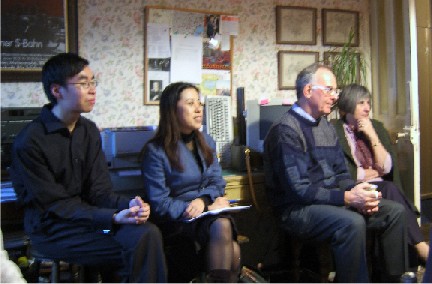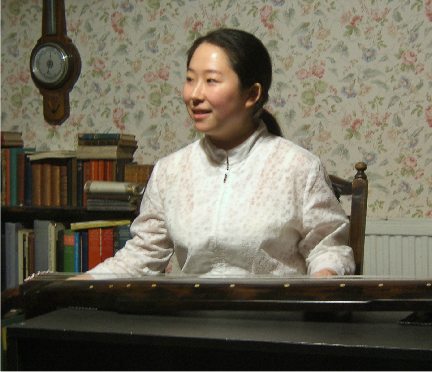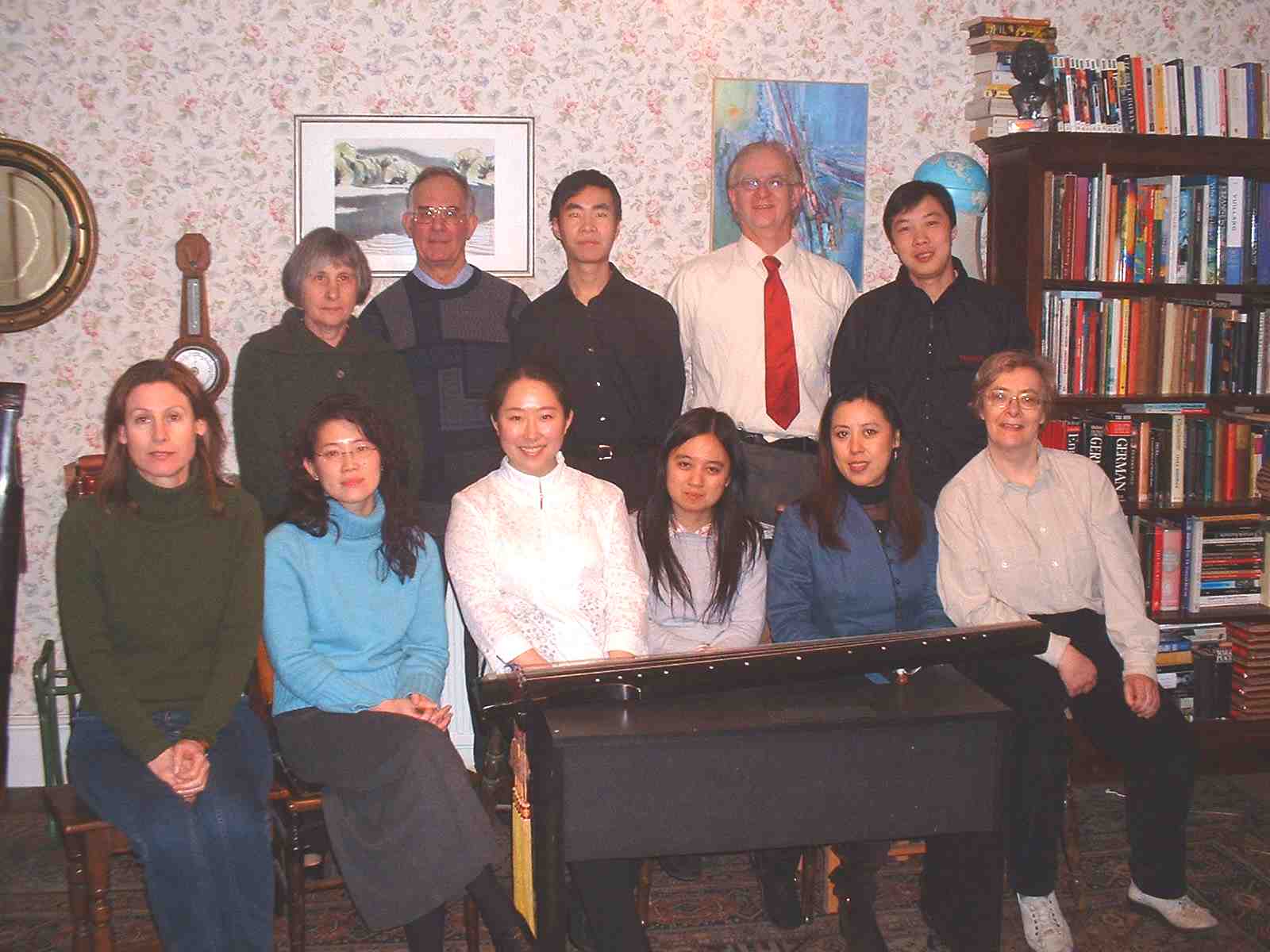12th December 2004
This, the 11th meeting of the London Youlan
Qin Society, was held at the home of Sarah Moyse in southwest
London.
Programme
- Charlie Huang: Guangling San, Qiu Feng
Ci [sung]
- Julian Joseph: Xian Pei Ying Feng (from Xilutang Qintong)
- Wang Tingting: Zhuzi Yin [sung], Yi Guren
- Brian Cox: Qiu Feng Ci
- Marnix Wells: Guangling San (first 2 sections)
- Li Yi: Guanshan Yue
- Cheng Yu: Guanshan Yue [sung], Ping Sha Luo Yan
All pieces were played on a qin made
by Zeng Chengwei in Chengdu, southwestern China, less than 1 year ago.
Introduction
Cheng Yu began the proceedings. We were pleased to welcome several
new members, including two from Sheffield University, which is home to
several qin players. Everyone introduced themselves for the benefit
of the new members. Julian Joseph then gave a brief review of the society's
activies since its inception in July, 2003. In the space of only 17 months,
we have been fortunate to have distinguished qin masters Gong Yi
and Li Xiangting visit us, and we were closely involved in organising the
guqin master classes they held in the summers of 2003 and 2004 respectively.
Both agreed to be our consultants, for which we feel deeply grateful. Qin
scholar Yip Mingmei has also visited us, and given fascinating talks about
women qin players through the ages and "nurturing life". Altogether
we have held 10 yajis. Full details of all these yajis are
on this web site.
 This was followed by a discussion on why Chinese music is still virtually
unknown in the UK, whereas Indian music is relatively popular. Some of
it may be due to early familiarity with Indian music, probably from the
colonial period. Written records show that it is was known, and presumably
accepted, in the UK at least 50 years ago. It was made popular during the
1960s by Ravi Shankar and George Harrison among others. So performances of
Indian music are generally well attended, whereas those of Chinese music
are not. There is a need to address this general lack of awareness of Chinese
music. With the increasing importance of China in the economic sphere, an
understanding of Chinese culture is also becoming necessary, and music
is an essential part of that culture. Most westerners who are interested
in Chinese music have come to it through an interest in other aspects of
Chinese culture. Interestingly, many westerners who play the qin are
also guitar players.
This was followed by a discussion on why Chinese music is still virtually
unknown in the UK, whereas Indian music is relatively popular. Some of
it may be due to early familiarity with Indian music, probably from the
colonial period. Written records show that it is was known, and presumably
accepted, in the UK at least 50 years ago. It was made popular during the
1960s by Ravi Shankar and George Harrison among others. So performances of
Indian music are generally well attended, whereas those of Chinese music
are not. There is a need to address this general lack of awareness of Chinese
music. With the increasing importance of China in the economic sphere, an
understanding of Chinese culture is also becoming necessary, and music
is an essential part of that culture. Most westerners who are interested
in Chinese music have come to it through an interest in other aspects of
Chinese culture. Interestingly, many westerners who play the qin are
also guitar players.
Cheng Yu then told us about her recent trip to China and Hong Kong,
and showed us her photographs. The primary purpose was for her 5-string
pipa project, in which she is creating a 5-string pipa based
on the instrument that was lost after the Tang Dynasty, with innovations
to expand its capabilities beyond those of the standard, modern 4-string
pipa. Apart from the additional bass string, the new instrument will
have a pair of sound holes. These were present in early pipas, but
are absent on modern ones. For more information on the 5-string pipa project,
please click here.
Her first stop was Hong Kong. There she attended a multimedia concert
combining Chinese orchestra with Chinese traditional and popular music.
She also attended a yaji held by the Sin Ya Qin Society. In
Beijing she met Professor Li Xiangting. She also met qin maker Wang
Peng, and visited Dan Nung Ing's newly opened tea house.
 These discussions were followed by qin playing. Highlights included
Charlie Huang's interpretation of the first two thirds of Guangling
San and Wang Tingting's qinge (qin song) Zhu Zhi Yin
(Song of the Bamboo Branch). She explained that it is a Ming Dynasty piece,
based on a folk song from the same period. She also said it is traditional
to sing qin songs in one's own dialect, rather than in Mandarins
so she used her native Changsha dialect. This inspired Cheng Yu and Charlie
Huang to sing as they played Qiu Feng Ci and Guanshan Yue,
and everybody else to join in. Cheng Yu rounded off the event with a beautiful
performance of Ping Sha Luo Yan.
These discussions were followed by qin playing. Highlights included
Charlie Huang's interpretation of the first two thirds of Guangling
San and Wang Tingting's qinge (qin song) Zhu Zhi Yin
(Song of the Bamboo Branch). She explained that it is a Ming Dynasty piece,
based on a folk song from the same period. She also said it is traditional
to sing qin songs in one's own dialect, rather than in Mandarins
so she used her native Changsha dialect. This inspired Cheng Yu and Charlie
Huang to sing as they played Qiu Feng Ci and Guanshan Yue,
and everybody else to join in. Cheng Yu rounded off the event with a beautiful
performance of Ping Sha Luo Yan.

Copyright the London Youlan Qin Society, 2005.
All rights reserved.

 This was followed by a discussion on why Chinese music is still virtually
unknown in the UK, whereas Indian music is relatively popular. Some of
it may be due to early familiarity with Indian music, probably from the
colonial period. Written records show that it is was known, and presumably
accepted, in the UK at least 50 years ago. It was made popular during the
1960s by Ravi Shankar and George Harrison among others. So performances of
Indian music are generally well attended, whereas those of Chinese music
are not. There is a need to address this general lack of awareness of Chinese
music. With the increasing importance of China in the economic sphere, an
understanding of Chinese culture is also becoming necessary, and music
is an essential part of that culture. Most westerners who are interested
in Chinese music have come to it through an interest in other aspects of
Chinese culture. Interestingly, many westerners who play the qin are
also guitar players.
This was followed by a discussion on why Chinese music is still virtually
unknown in the UK, whereas Indian music is relatively popular. Some of
it may be due to early familiarity with Indian music, probably from the
colonial period. Written records show that it is was known, and presumably
accepted, in the UK at least 50 years ago. It was made popular during the
1960s by Ravi Shankar and George Harrison among others. So performances of
Indian music are generally well attended, whereas those of Chinese music
are not. There is a need to address this general lack of awareness of Chinese
music. With the increasing importance of China in the economic sphere, an
understanding of Chinese culture is also becoming necessary, and music
is an essential part of that culture. Most westerners who are interested
in Chinese music have come to it through an interest in other aspects of
Chinese culture. Interestingly, many westerners who play the qin are
also guitar players.  These discussions were followed by qin playing. Highlights included
Charlie Huang's interpretation of the first two thirds of Guangling
San and Wang Tingting's qinge (qin song) Zhu Zhi Yin
(Song of the Bamboo Branch). She explained that it is a Ming Dynasty piece,
based on a folk song from the same period. She also said it is traditional
to sing qin songs in one's own dialect, rather than in Mandarins
so she used her native Changsha dialect. This inspired Cheng Yu and Charlie
Huang to sing as they played Qiu Feng Ci and Guanshan Yue,
and everybody else to join in. Cheng Yu rounded off the event with a beautiful
performance of Ping Sha Luo Yan.
These discussions were followed by qin playing. Highlights included
Charlie Huang's interpretation of the first two thirds of Guangling
San and Wang Tingting's qinge (qin song) Zhu Zhi Yin
(Song of the Bamboo Branch). She explained that it is a Ming Dynasty piece,
based on a folk song from the same period. She also said it is traditional
to sing qin songs in one's own dialect, rather than in Mandarins
so she used her native Changsha dialect. This inspired Cheng Yu and Charlie
Huang to sing as they played Qiu Feng Ci and Guanshan Yue,
and everybody else to join in. Cheng Yu rounded off the event with a beautiful
performance of Ping Sha Luo Yan.
